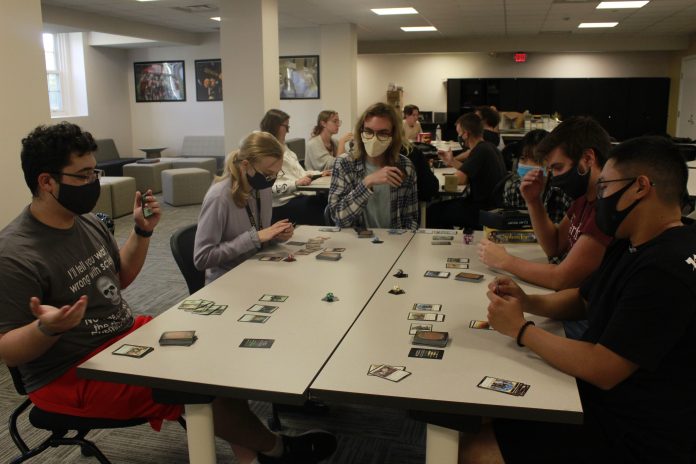
Language professors at DePauw are trying to find the balance between students’ health and education when it comes to teaching a foreign language with a mask during a pandemic.
With school returning to in-person learning, faculty and students were under the assumption that classes would return as they once were. They were wrong. When Chinese, Latin, Spanish, or Italian professors wear masks, it comes with a new set of hurdles. Teaching a new language is hard to begin with, particularly when communication is impaired by a piece of cloth covering half of your face, making it challenging for students to hear how words are supposed to be pronounced.
Chinese professor Yu-Hsin Lin enforces the mask policy for all of her classes and follows the policy herself. She compared it to talking on the phone when she said, “You can really see their facial expressions, but only from their eyes. And, especially for languages, you can only hear the sound, but I can't really see the mouth shape.”
Other professors agree that it is a challenge to teach a foreign language with a mask mandate, saying masks would severely hinder the learning processes and they are concerned about the students’ abilities to absorb and learn the language.
Teaching a language, with or without masks, comes with a unique set of benefits and consequences.
Zoe Knight, a first-year, is currently taking Italian. “I feel like when you’re talking, it would be hard to understand you with the mask on, however [having class without masks] makes me nervous. There was someone in class coughing today and I was moving my chair. That was the only thing that made me nervous, but otherwise I feel completely comfortable.”
Every professor has their own mask policies that are detailed in their syllabi. If and when a student has any issues with the regulations put in place, they are encouraged to speak with the instructor to decide an alternative that meets both parties' needs.
According to professor Lin, “People's health is more important than language learning of course. But, I think we are still doing fine wearing a mask to learn a language.”
She added that her students are doing well under the circumstances.
First-year Rebecca Kluesner said, “I am a little bit behind in my learning with my language and I think part of that is because I spent the last year and a half learning behind the mask.”
Without the visual of the teacher's mouth articulating the words, the oral and overall comprehension of the foreign language becomes strenuous.
In order to make up for that lost demonstration, she plans to seek out Depauw’s language tutoring sessions and currently takes advantage of her Spanish professors’ office hours.
“I think my language has been affected to some degree because of the masks, but right now it's not urgent. I think what's more urgent right now is stopping the spread of COVID-19,” Kluesner said.
While teaching and learning certain parts of the curriculum becomes increasingly difficult with masks, the overall health and safety of faculty and students is the top priority. Although students have a language requirement to fulfil, DePauw takes the well-being of others into account first.
However, putting each other's health first does not have to come with a price.
As tricky as it might be to teach and learn through a mask, professors are coming up with a variety of strategies to be better able to effectively teach their classes. Meanwhile, students are also adapting by using the resources they have at their disposal.
Each language contains its own set of unique tones, words, and sounds that automatically make the oral part of the curriculum troublesome, and masks are just another obstacle. Language professors have embedded different methods into their classes to bridge the gap of communication that the masks single-handedly created.
“For the pronunciation parts, it takes a little longer in my teaching this year,” professor Lin said.
She describes in detail how to pronounce words without being able to show the class. Instead of demonstrating where to put your tongue or how to shape your mouth, she uses a variety of descriptive words to aid students in pronunciation.
Emily Perez, a first-year enrolled in a Spanish course, said, “I have noticed that my professor decides to repeat what students and herself had communicated to the class in order to help those who could possibly not capture what is being communicated.”
Instructors also make themselves available for office hours and DePauw offers numerous language tutoring sessions to help those who are struggling. Professor Lin makes those sessions worth 5% of grades, while another professor offers extra credit if any of their students attend the tutoring.
Preventing COVID-19 in the classrooms is an adjustment, but DePauw staff and students have found ways to keep going. The pandemic has caused many obstacles, but students are taking the initiative in their education to make up for the hindrances it has created and professors are taking necessary precautions to keep their classes safe.
